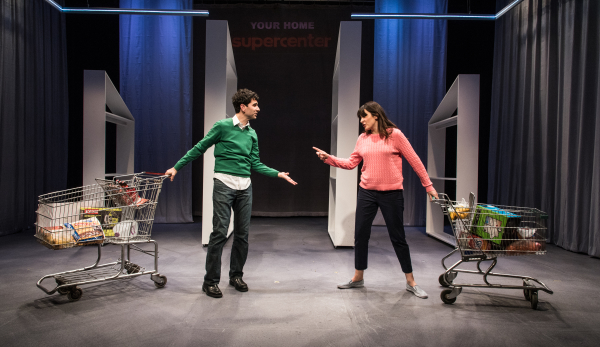Love/Sick

(© Russ Rowland)
John Cariani's vignettes of romance and heartache are back and peculiar as ever in Love/Sick, now making its New York debut at the Royal Family Performing Arts Space in Midtown Manhattan. If you're familiar with his first collection of idiosyncratic stories in the widely produced Almost, Maine, Love/Sick will feel like a reunion with old friends. Only this time, the revolving door of couple who were once falling in love, are neck deep in the muck that follows. Cariani, however, is one of the last remaining playwrights to see this romantic muck through such an endearing lens.
The production, directed by Chris Henry, contains nine two-person scenes, played in and out by a chorus of ponytail-whipping dancers performing Joann M. Hunter's energetic and thoroughly entertaining choreography. Simone Harrison, Debargo Sanyal, Dee Roscioli, and Cariani make up the four-person cast, mixing and matching throughout as they take on different characters. The only link joining the short plays is the "Supercenter," a grocery store that makes a cameo in each of the scenes one way or another (set designer Shannon Rednour sparsely suggests the setting with a line of sleek white shelves).
The opening scene takes place in the store's aisles where two strangers (Sanyal and Roscioli) pounce on one another like a pair of love-hungry wolves. After an extended back-and-forth of serendipitously identical dialogue, they discover that they're both afflicted with the rarely diagnosed obsessive impulsive disorder (not to be confused with obsessive compulsive disorder). The condition makes them act on all of their whims, most of which lack a basic level of pragmatism — like, for example, falling in love at first sight — which they seem to have done with one glance across a crowded mega-mart. Love, after all, is not governed by logic. Consequently, the only reasonable thing to do is avoid the temptation altogether — like a recovering drug addict would steer clear of his former crack den.
Cariani's world of metaphors and heightened realities, though never veiled in their messages, always engage our common experiences from angles just crooked enough to reveal something new. The offbeat scenarios continue with a man, physically incapable of hearing the words "I love you" — a phrase that "dazzles" his nervous system into submission. Then there's the wife who searches her garage for the self she seems to have lost since marriage and children came into the picture; the married couple who unconsciously cringe at the prospect of physical contact; and the boring spouses who have literally "lost the fun" since tying the knot.
The quartet of actors makes for a strong ensemble, each settling comfortably into Cariani's unique brand of neurotic humor. Roscioli particularly shines in her characters' more vulnerable moments. Each one remains solidly grounded even as they dabble in a zany realm with rules that may only loosely apply to our own world.
As is the case in Almost, Maine, every possible permutation of pairings is represented — both same- and opposite-sex. However, sexual orientation, race, religion, and the like, never factor into any of the interactions. After all, love sickness is an equal-opportunity ailment. This is part of the charm of Cariani's malleable (and easily mountable) plays: remaining steadfastly unbeholden to the world of social politics. Cynics may find his theatrical voice too precious for comfort, but if your nervous system can take it, prepare to be dazzled.











